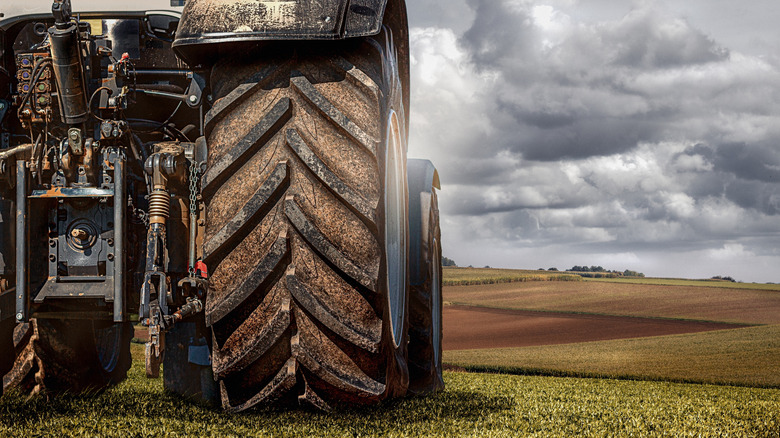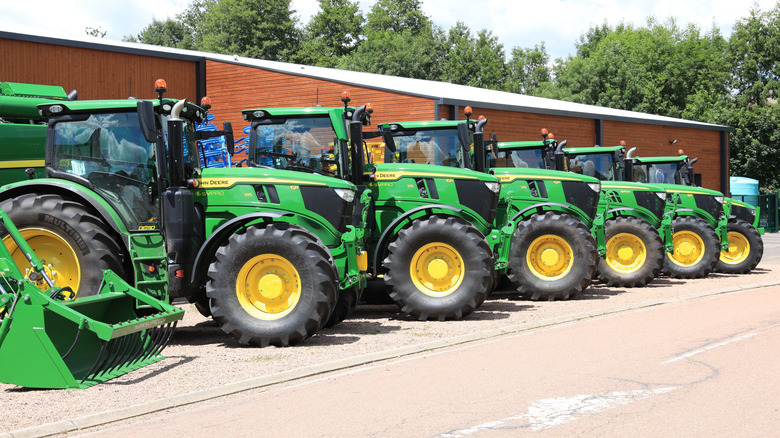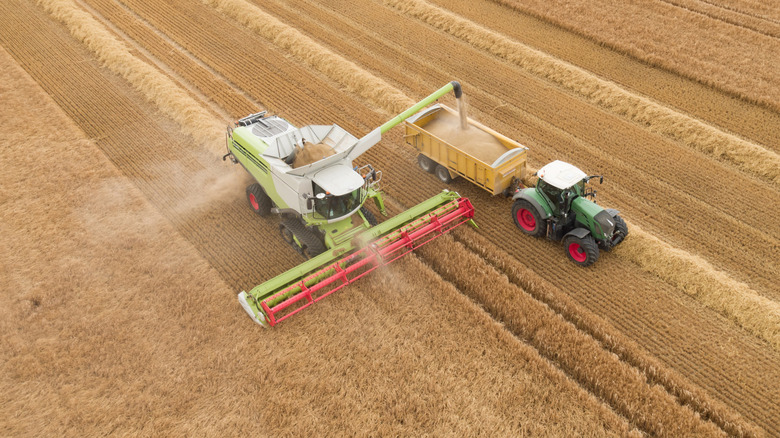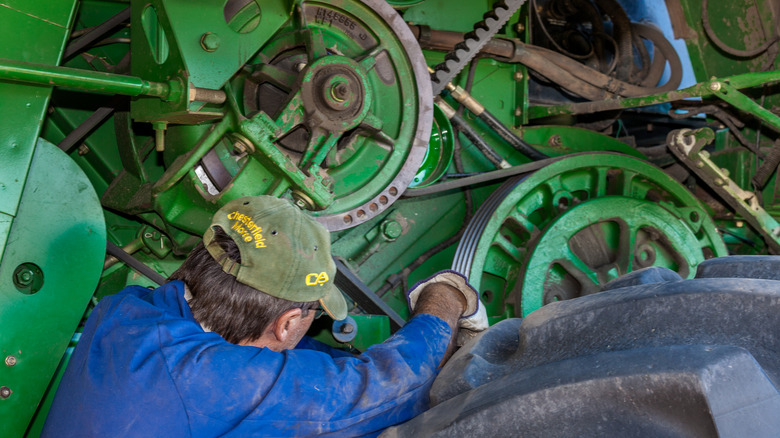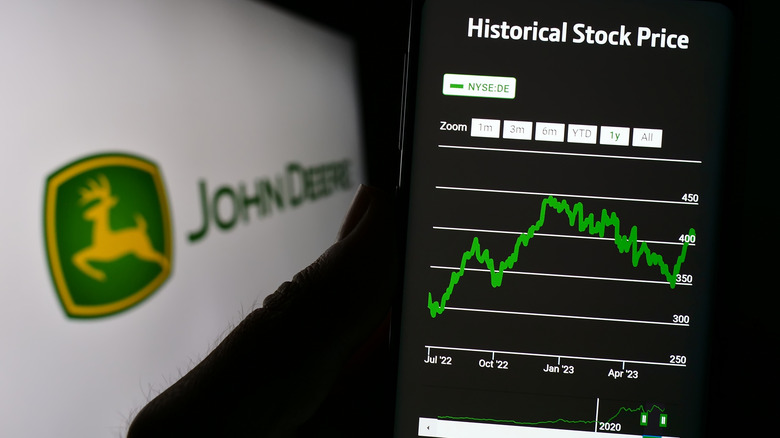How John Deere Is Exploiting Farmers (And Why It Affects Us All)
The right to repair is a concept as old as ownership itself — if not explicitly stated. For as long as property rights have been in force among the great compact of humankind (i.e., the idea that we are bound by a set of rules that we created for ourselves with the intention of making life better for all), so too has the idea that we own our things. The shirt on your back is your own, and you can loan it to your neighbor if you wish, but he cannot take it from you. Unfortunately for farmers and consumers alike, brands like John Deere are looking to reimagine this concept.
This great theoretical concept has come under the gun in the last few decades. Apple, for example has found itself on the wrong side of consumer sentiment in recent years through aggressive and conniving tactics. The company weaponizes the Digital Millenium Copyright Act and does all it can to retrieve old phones and destroy them, eliminating as much supply as possible from the replacement marketplace. John Deere has followed suit and has begun seeking to wrest control of autonomous ownership within the world of farm equipment from the very people it sells this gear to. The famed American tractor company has become downright hostile to the farming community that it's meant to serve. While Apple's specific repair monopoly is harmful most intensely to a subset of American consumers, the John Deere stranglehold that farmers find themselves gripped by affects all Americans. It's part of a larger war against consumers, affecting precedent and the global agricultural marketplace at the same time.
The first sale doctrine, a foundational principle in consumer behavior, is under threat
The first sale doctrine is a keystone principle of our copyright system. It creates ownership rights for a buyer of a good. Whether that thing is a singular, tangible object like a lamp or pair of jeans, or a digital copy of something like a book or album. The first sale doctrine gives a buyer the right to do what they wish with their copy of that thing. This is why you can't copy a CD and then sell the resulting product — you own your copy of the work, but not the work itself. A John Deere tractor is seemingly a classic example of a thing one might choose to buy. A farmer might purchase a new John Deere tractor and then bring it home to use it, just like they would with their car or any other physical good.
John Deere has begun to argue that buyers aren't really buying their product at all, though. Instead, they're arguing that buyers are actually licensing the product in the same way that an Amazon eBook sale is actually the purchase of a license to read the piece rather than a traditional sale of the work, as would be the case with a physical copy. This perhaps makes a John Deere tractor something else to add to the list of things you shouldn't buy brand new. Importantly, the distinction eviscerates consumer ownership protections, and allows the seller to impose rules on a buyer's use. For most, the idea that you can 'buy' a tractor in every sense of the word but still not own it is beyond the pale. Not for John Deere, though.
Modern John Deere tractors are virtually unrepairable without the company's diagnostics software
The means by which John Deere seeks to impose its "ownership" over new tractor sales is through a process of modernization that has afflicted many different industries. By introducing computerized control over every component in the vehicle, a tractor is essentially an analog extension of the computer programming itself. What once was a physical power source is now computer code that sends digital signals to the engine, claw arm, or lights. Because everything is controlled by the tool's internal computer system, everything on the tractor operates much smoother and with far greater versatility. However, if the computer experiences a sensor failure, broken part, or any other wrench in the gears, it can, and will, shut down the whole system. A cracked windshield or faulty sensor will result in a tractor that's totally inoperable.
On older gear, farmers are often well-versed in the time honored tradition of sourcing a part and making the necessary repair. But on new John Deere models, the tractor won't regain operability without a reset of the computer system. The company won't allow farmers to buy, rent, or personally use these tools, forcing them to wait for technicians to arrive or shell out the cash to bring their heavy equipment to a dealership to diagnose the issue, which may be as simple as a faulty sensor or dead bulb. Of course, because of the scarcity involved, repairs are astronomically more expensive than they would be without the intervention of a John Deere technician. Service profits are five times the volume of new sales for John Deere, clearing up any ambiguity about why the company has decided to go this route, antagonizing their customer base in the process.
Naturally, this makes farming more expensive, which delivers wider consequences to the market
Most visibly, this makes the process of farming more expensive. The more a farmer has to spend to get their product to the market the higher the cost to consumers on the far end of that supply chain will become. By forcing farmers to spend far more time and money on their repair needs, John Deere is upsetting a delicate ecosystem. For one thing, funneling all repairs through local dealerships means that farmers often have to wait for weeks or even months to get their essential equipment back in working order. This can ruin a harvest or substantially alter the output, making produce or meat products scarcer across the marketplace and generally pricier even if constraints don't limit output. In a very real sense, this is a direct factor translating into the inflationary conditions that consumers feel in their bank accounts.
There are indirect consequences to consider, as well. A successful reshaping of the way users interact with the products they've bought emboldens other conglomerate businesses to deploy the same kinds of tactics. Apple is one of the most prominent abusers of the consumer's right to repair in the contemporary marketplace. The company stamps miniscule logos inside its components, for instance. These are invisible to consumers but allows Apple to argue trademark infringement when a viable part is salvaged from an old device and used to repair one still in service. It did just that in 2020 while arguing (successfully) in the Norwegian Supreme Court against a repairer's use of refurbished screens.
Farmers have begun hacking their equipment to attempt to regain their right to repair
Instead of taking this change of pace lying down, farmers across America are looking for alternatives. One point of reprieve from the headlock is simply resorting to older tools. They won't share all the same technology-infused capabilities like GPS systems or automation, but an old tractor is actually more reliable than a new one considering the all-important ability to repair its operational components.
Another avenue that farmers are using to fight back is the use of third-party software sourcing. Farmers are looking farther afield and coming into contact with brokers who deliver pirated copies of the John Deere diagnostic software. The Library of Congress created an exemption to the DMCA in 2015, essentially allowing farmers to legally source and utilize alternative modes of access to repair their own tractors. However, John Deere responded by updating its terms of service and disallowing software modifications. Farmers are effectively hacking their equipment in order to conduct the same repairs they've been delivering to their gear for decades, if not centuries. The only difference is the computerized brains of the tools they use today.
Great for investors, terrible for consumers
Consumers lose at all phases of this dangerous game. Lawmakers are consistently in agreement that consumers have always retained a right to manage the things they own virtually however they want. Specifically, this includes a critical right to repair their own stuff, be that the sole of a shoe or a hulking piece of farm equipment. But companies across industries have routinely acted in ways designed to chip away at those rights. You might have an inalienable right to repair your iPhone, but you don't necessarily have a right to access the essential components, Apple reasons. Similarly, Amazon, Microsoft, and others have worked tirelessly to maintain a steady march toward planned obsolescence through software support sunsets, proprietary parts (like screws that hold the outer shell of a device together), and even closely guarded diagnostic tools, as is the case with John Deere.
Businesses across the marketplace discovered long ago that selling services – and blurring the lines of ownership, either intentionally or as a neat consequence – is more profitable than selling new gadgets. Great tools are often built to last, so businesses can't necessarily rely on a steady and rapid stream of repeat customers lining up for replacements. But monopolizing the repair and maintenance cycles of those tools allows businesses to continue reaping the profits. This is naturally a massive windfall for large scale investors and executives, who continue to enjoy ballooning profits and heightened salary figures (John Deere's CEO made $26.7 million in 2023). The relationship is poisonous for consumers, though, who are forced into more expensive purchasing and repair decisions because of this monopolization.
